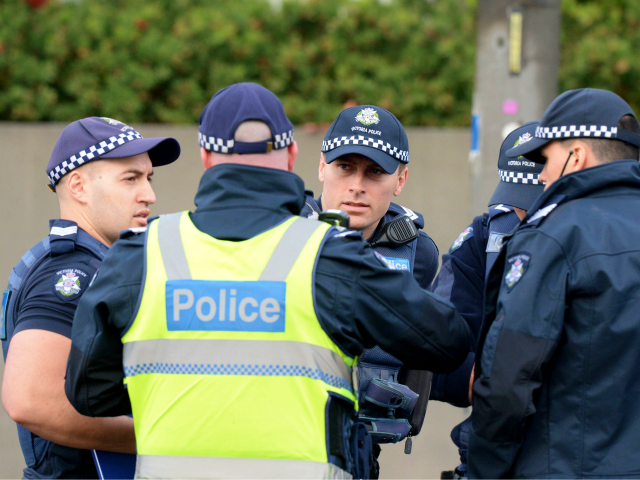Officers of the Australian Federal Police (AFP) raided the Canberra home of News Corp journalist Annika Smethurst on Tuesday morning, a little over a year after Smethurst published a story that leaked government discussions about enhanced surveillance powers.
News Corp blasted the raid as a “dangerous act of intimidation” against journalists.
A police statement indicated the warrant for the raid was obtained based on “the alleged publishing of information classified as an official secret, which is an extremely serious matter that has the potential to undermine Australia’s national security.” The AFP said it did not expect to make any arrests as a result of the raid.
The Sydney Morning Herald summarized Smethurst’s April 2018 report and the reaction to it:
Smethurst’s story reported the top secret proposal as one that would for the first time allow the ASD to target Australians, as opposed to enemies on foreign soil. The use of the powers would be subject to approval from the defence and home affairs ministers.
Government sources were quoted as calling the proposed powers a “political power grab” that had concerned some insiders.
The secretaries of the Home Affairs and Defence departments, Michael Pezzullo and Greg Moriarty, and the director-general of ASD, Mike Burgess, hit back at the story, saying there was “no proposal to increase the ASD’s powers to collect intelligence on Australians or to covertly access their private data”.
ASD is the Australian Signals Directorate, the country’s leading cybersecurity agency. The plan Smethurst revealed would have allowed the ASD to access data such as emails and bank accounts belonging to Australian citizens, activities it is currently barred from engaging in.
Soon after the raid on Smethurst’s home, broadcaster Ben Fordham announced he was also the target of a probe over a different matter, a story he covered about asylum seekers attempting to reach Australia.
According to Fordham, he and his producer were contacted several times by officials from the Department of Home Affairs who said “highly confidential” material had been leaked to him when he prepared his report. Fordham said these officials concluded their conversations with him by warning the AFP might launch a criminal investigation of the leak.
“The chances of me revealing my sources is zero. Not today, not tomorrow, next week or next month. There is not a hope in hell of that happening,” Fordham declared.
Smethurst had not said much in public about the raid on her home as of Tuesday afternoon, beyond confirming that it occurred, but her Twitter feed indicates she is interested in Fordham’s story and she has retweeted some condemnations of her own raid by media and press freedom organizations.
“This raid demonstrates a dangerous act of intimidation towards those committed to telling uncomfortable truths. What’s gone on this morning sends clear and dangerous signals to journalists and newsrooms across Australia. This will chill public interest reporting,” News Corp Australia said on Tuesday.
“Annika Smethurst’s story was clearly within the public interest. This intimidating behavior by the police poses a serious risk to our democracy, and undermines the accountability of the government to the people that it serves,” said the Australian Lawyers Alliance.
Digital Rights Watch called the raid a “gross abuse of national security powers” to “reinforce a culture of secrecy and lack of accountability in our law enforcement apparatuses.”
“This is an obvious attempt to bully and intimidate journalists reporting on the latest attempted power grab by the already over-powerful Department of Home Affairs,” said Electronic Frontiers Australia.
Australian journalism union MEAA, the Media Entertainment and Arts Alliance, denounced the raid as an “outrageous attack on press freedom” and an effort by the government to “punish those who have brought to light vital information.”
“It is an outrage that more than a year after the story was reported in April 2018 but just days after the federal election result, the Federal Police are now raiding a journalist’s home in order to seize documents, computers and a mobile phone in order to track down the source,” the MEAA said.
Many of Smethurst’s fellow journalists criticized the raid as a seemingly arbitrary action with little clear purpose beyond intimidation, highlighting the bitter irony of federal police seizing Smethurst’s cell phone and computers a year after she wrote a story exposing plans to put Australian citizens under electronic surveillance. The decision to conduct an intimidating raid on her home instead of her office was questioned.
In a fiery editorial on Tuesday, the Australian, owned by News Corp, called the raid a “hammer blow against reporters working in the difficult field of national security and intelligence,” as well as an “equally blunt warning to public servants” that they should keep their mouths shut.
Like the MEAA, the Australian suspected the timing of the raid had something to do with recent federal elections, calling on Prime Minister Scott Morrison to “step up” and honor the commitment to basic freedoms he made during his campaign.
Morrison, who is currently in London, refused to comment on “security matters” and directed inquiries to the AFP, noting the agency conducts investigations on its own initiative.
“Australia believes strongly in the freedom of the press and we have clear rules and protections for freedom of the press and there are also clear rules protecting Australia’s national security and everybody should operate in accordance with all of those rules,” Morrisson said.
“It never troubles me that our laws are being upheld,” he added.

COMMENTS
Please let us know if you're having issues with commenting.